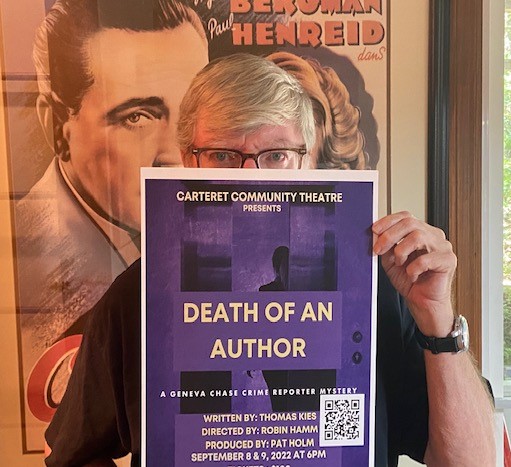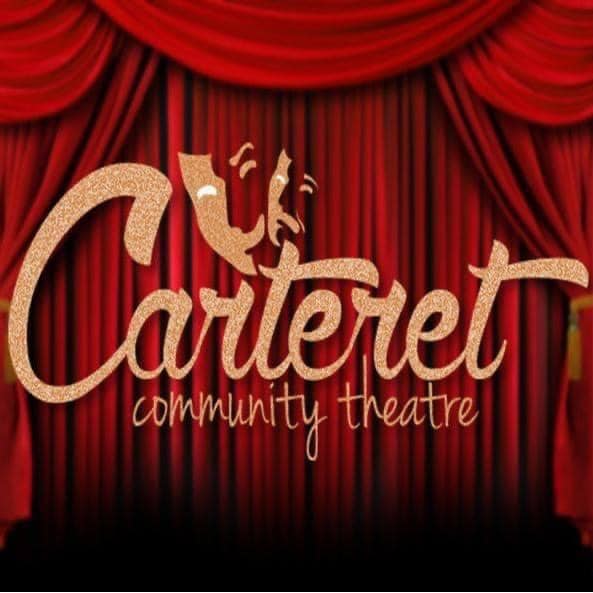Full disclosure…Cindy is my wife and she’s written a glowing review of the dinner theater we did a couple of weeks ago. It was my first attempt at writing for the theater and Cindy’s effusive compliments make me blush. That being said, here it is, a shameless bit of self-promotion.
The launch of Thomas Kies’ Whisper Room, his fifth book in the Geneva Chase series, was as masterfully orchestrated as his novel. Kies took the unique approach of dramatizing the book launch as a play within a play – which he also wrote. Talented community theatre actors brought the books’ characters to life.
The play, Death of an Author, was performed in a dinner theatre format to sold-out audiences of more than 100 guests on each of two evenings. The performance took place at the newly built culinary school at the county’s community college under the leadership of Shana Olmstead, also the co-owner of Morehead City Floyd’s 1921 premiere restaurant. The 3-course dinner was prepared by the students of the culinary school under the supervision of 2 local Escoffier chefs. The funds raised from the evenings’ performances went directly to supporting students of the culinary school and to the community theatre’s capital campaign to rebuild the theatre heavily damaged by Hurricane Florence in 2018
The emcee for the evening, Pamela Long, oriented the audience to the Geneva Chase mystery series, while the performers mingled among guests and brought the action tableside.
Each actor was given the freedom to develop their book characters as they adopted them, infusing humor and several surprise interactions. Robin Hamm, the director, molded the diversity of characters into the murder mystery storyline characteristic of Kies’ novels.
Those familiar with the series also recognized dominatrix Shana Neese (realistically portrayed by Karen Lutz), Frank Mancini and his wife, Evelyn (Ray Tillery and Mylissa Maynard), and Gregor Tolbonov (Eduardo Alen). Caroline Bell (Mara Jennings ), Geneva Chase’s ward, rounded out the cast.
Minutes into the performance, it was clear that the author, played by Matt Brooks, had unknowingly ingested cyanide laced wine. He ‘dies’ on the dining room floor. Geneva Chase (the well-known protagonist of the Kies crime series played by Kim Murdoch) and Matt Dillon assistant Chief of Police (played by theatre veteran Ken Hamm) unsuccessfully attempted to revive him. His limp body was slid out on a tarp by Dillon and Private Investigator John Stillwater (David Griffith) while servers with entrée platters swerved out of the way. Publicist Mandy Chahall (Rhonda Osterhoudt) quickly calmed fears by assuring everyone that even though the author was dead his books would still be for sale - even though it may be difficult to get them signed.
Geneva confirms that all in the room are suspect. It was the responsibility of each to determine ‘who killed the author.’
Kies created a mind-boggling matrix as the characters realized their lives continued even though their creator was dead. This awareness grows as does the realization their freedom to follow their own dreams. With motives and motivations for the murder revealed and with fingers pointing in all directions, the audience was challenged to identify the murderer. Prizes were given to those who first correctly figured out the mystery and for the best sleuth costume.
It was a fun filled evening that benefitted all participants. Each audience called for a repeat experience at the end of the evening. Books sales were strong and the real author, Kies, signed each.






